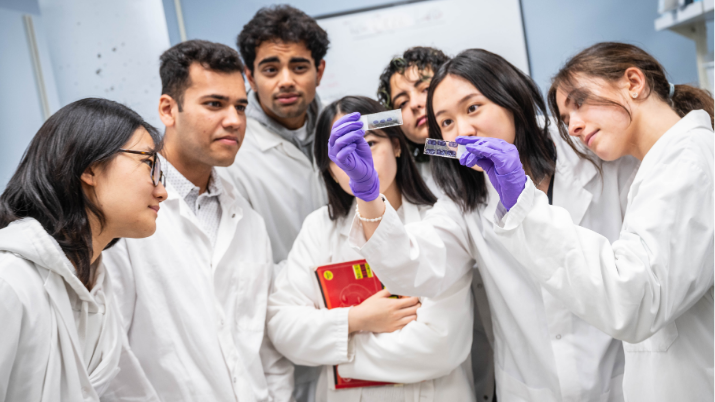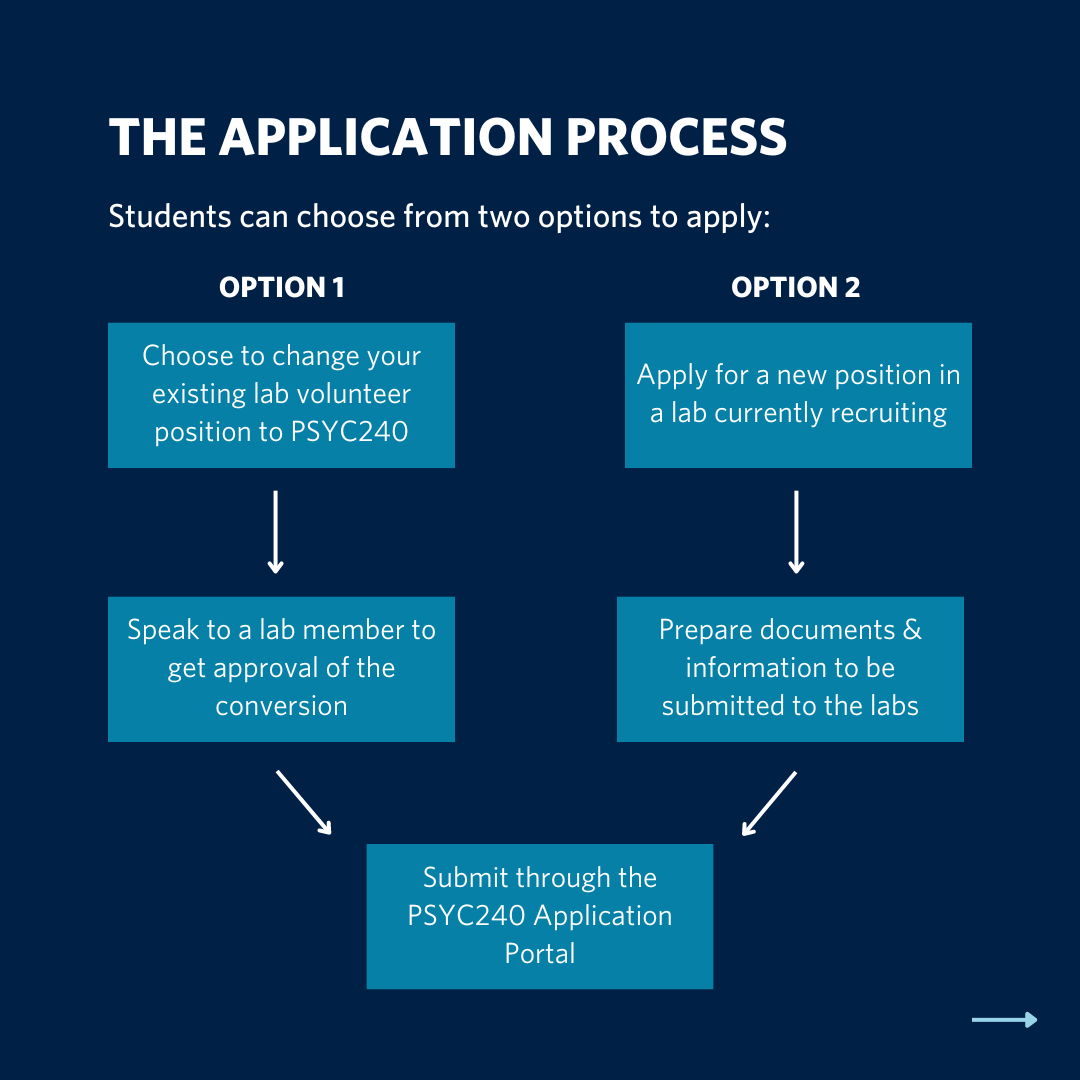

Student RAs in the Soma Lab. Photo: Paul Joseph, UBC Brand & Marketing.
UBC Psychology undergraduate students can enrol in PSYC240 to get course credit for their work in psychology labs.
PSYC240: Research Experience is an elective course to help students get involved in hands-on research. Led by Dr. Darko Odic (he/him), an associate professor in the department of psychology, PSYC 240 provides students with an opportunity to work in a research lab for course credit instead of volunteering their time.
Students can join PSYC240 either after securing a volunteer position in a psychology lab on their own or by having a lab accept them in a new position through the PSYC240 Application Portal. Now in its third year, the psychology department continues to refine the PSYC240 application process and experience. This year, for the first time, PSYC240 students can apply for a scholarship to cover the cost of tuition for the course.
In a Q&A, Dr. Odic expands on what PSYC240 is and how the course makes research opportunities more accessible to students
Can you tell us more about PSYC240?
The central goal of PSYC240 is giving students an alternative arrangement of working in a psychology lab for course credit, if they prefer this to volunteering. Students can either convert their existing volunteer positions into PSYC240 to now earn course credit for their time or can alternatively use a centralized portal application to apply for positions in labs that are still actively taking PSYC240 students. And— because we can better understand which students are getting these positions—we also hope to better understand and address other barriers that prevent students from being able to join labs when they do choose to apply.
How will students benefit from this course?
Students taking this course can benefit in two ways. First, as research assistants (RAs) students will get hands-on experience doing empirical psychology research (for a description of the kinds of skills students can expect to learn, check out the list of labs and the typical roles RAs take here). Second, students enrolled in the course will also be able to access various resources on Canvas built for the course. This includes asynchronous lectures on careers in psychology, tips for joining labs beyond the course, and more.
How do students apply for PSYC 240?
For students who already have a volunteer position lined up and who would like to convert it to PSYC240, the process is very simple: complete the application portal and simply check off a box that you are not applying for a position but converting one. We take care of everything behind the scenes from there.
For students who are applying for a lab position, there are two steps. First, students complete the centralized application, which importantly has them attaching their resumes and selecting the labs they are interested in joining and adding a brief description for each lab they select about what drew them to the lab. Once completed, each selected lab gets notified about a student applying to their lab and receives the description and their resume (the labs do not see what other labs each student applied for, nor any of the optional demographic information). Each lab then has their own internal protocols: some will ask for a secondary application, some might ask for an interview, some might ask for transcripts, etc.
All of this information is available on the list of labs accepting students, so there are no surprises. Once a lab decides to take a student on and the student accepts their offer, the PSYC240 Coordinator is notified, and we take care of the administrative details.


Can you tell us about the new tuition awards?
In 2024/2025, the Department of Psychology is for the first time offering a number of awards to help offset the tuition cost for students in PSYC240. Each award value is $600, for both domestic and international students. Students who want to take PSYC240 but the cost of tuition is a barrier will be prioritized for these awards. Students indicate that they are interested in receiving this award in the Portal, alongside a brief description of the impact the award would have on their experience. If student interest in this award exceeds funding available, awards might be made on a non-competitive basis (e.g., a lottery for all students who have expressed interest).
What can students do to increase their chances of being successfully enrolled in PSYC240?
There are, of course, many fewer RA positions than students interested in taking them. To maximize the chance of getting into the second round, there are two bits of advice we can give:
- Read the description of what the lab you are applying to is working on carefully, and think about why you are interested in joining the lab. The more you can show that you have thought about what about a lab’s research appeals to you, and what existing skills you have that might compliment their work, the more likely it is that the lab will contact you for the second round. Here is a specific example: my own lab does research on cognitive development, including on how children learn language, mathematics, and metacognition. A truly excellent application not only shows awareness of this, but also gives examples of what or why, exactly, draws the student to our research program (e.g., an interest in a future career as an education, or perhaps some personal experience that makes one of these topics especially topical, or a theory that you learned about in a class that keeps you up at night, etc.).
- The resume that you include does not need to be extensive, but it needs to be specific. Think about the kinds of skills you already have that would be valuable to the labs you are applying to (e.g., customer service experience, coding experience, statistics courses you have taken, etc.). We provide several resources on making a good resume on the Portal, but what is especially worth emphasizing is that labs will care a lot about the skills you have or want to develop more so than, for example, where and when you finished high school.
- The resume that you include does not need to be extensive, but it needs to be specific. Think about the kinds of skills you already have that would be valuable to the labs you are applying to (e.g., customer service experience, coding experience, statistics courses you have taken, etc.). We provide several resources on making a good resume on the Portal, but what is especially worth emphasizing is that labs will care a lot about the skills you have or want to develop more so than, for example, where and when you finished high school.
- Keep trying! Getting a position in a psychology lab is a very competitive process, and PSYC240 doesn’t automatically increase your chances. Use resources provided by the PSA on applying to labs, get feedback from students you know who are already in one, and continue applying whenever positions are open.


